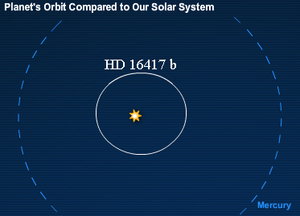HD 16417 b
| Extrasolar planet | List of extrasolar planets | |
|---|---|---|
 orbit (0.38AU) in our Solar System. | ||
| Parent star | ||
| Star | HD 16417 | |
| Constellation | Fornax | |
| Right ascension | (α) | 02h 36m 58.61s[1] |
| Declination | (δ) | –34° 34′ 40.7″[1] |
| Apparent magnitude | (mV) | 5.78 |
| Distance | 84.1 ± 0.9[1] ly (25.8 ± 0.3[1] pc) | |
| Spectral type | G1V | |
| Orbital elements | ||
| Semimajor axis | (a) | 0.14 ± 0.01 AU |
| Periastron | (q) | 0.11 AU |
| Apastron | (Q) | 0.17 AU |
| Eccentricity | (e) | 0.20 ± 0.09 |
| Orbital period | (P) | 17.24 ± 0.01 d (0.04720 ± 0.00003 y) |
| Argument of periastron |
(ω) | 77 ± 26° |
| Time of periastron | (T0) | 2450099.74 ± 3.3 JD |
| Physical characteristics | ||
| Minimum mass | (m sin i) | 0.069 ± 0.007 MJ (21.93 ± 2.22 M⊕) |
| Discovery information | ||
| Discovery date | February 23, 2009 | |
| Discoverer(s) | O’Toole et al. | |
| Discovery method | radial velocity | |
| Discovery site | Anglo-Australian Observatory | |
| Discovery status | Published[2] | |
| Other designations | ||
| Database references | ||
| Extrasolar Planets Encyclopaedia | data | |
| SIMBAD | data | |
| Exoplanet Archive | data | |
| Open Exoplanet Catalogue | data | |
HD 16417 b (also called λ2 Fornacis b) is an extrasolar planet located approximately 84 light years away in the constellation of Fornax, orbiting the 6th magnitude G-type main sequence star HD 16417. This planet has minimum mass only 7% that of Jupiter, making this a Neptune-mass planet. In addition to this, it orbits relatively close to the host star and suffers high temperature. It is the third planet discovered in Fornax constellation on February 23, 2009. This planet was discovered by a method called the radial velocity method.
References
- ↑ 1.0 1.1 1.2 1.3 van Leeuwen, F. (2007). "Validation of the new Hipparcos reduction". Astronomy and Astrophysics 474 (2): 653–664. arXiv:0708.1752. Bibcode:2007A&A...474..653V. doi:10.1051/0004-6361:20078357. Vizier catalog entry
- ↑ O’Toole, Simon et al. (2009). "A Neptune-mass Planet Orbiting the Nearby G Dwarf HD16417". The Astrophysical Journal 697 (2): 1263–1268. arXiv:0902.4024. Bibcode:2009ApJ...697.1263O. doi:10.1088/0004-637X/697/2/1263.
Coordinates: ![]() 02h 36m 58.6079s, −34° 34′ 40.717″
02h 36m 58.6079s, −34° 34′ 40.717″